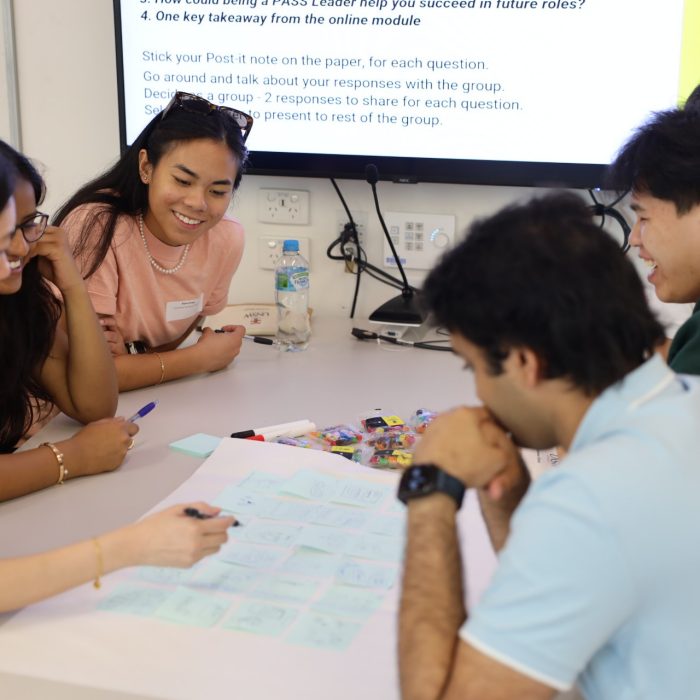Peer Assisted Study Sessions (PASS)


PASS is offered in 31 undergraduate and 16 postgraduate courses at UNSW Business School


Current PASS timetables | Term 1 2026
Join Peer Assisted Study Sessions (PASS), a peer-facilitated program offering weekly 60-minute out-of-class study sessions for all undergraduate and postgraduate students enrolled in select UNSW Business School courses. PASS is for all students who want to boost their academic performance and build confidence in their studies.
Friendly and informal, PASS sessions are conducted in small groups, providing an opportunity to reinforce key concepts and connect with peers in the same course. Sessions are led by PASS leaders, students who have excelled in the course. They are trained to facilitate group discussions and problem-solving. Each session’s content is student-driven to meet your specific needs.
In addition to academic benefits, PASS offers a great opportunity to connect with peers and make friends with fellow students.
-
- ACCT2511 Financial Accounting Fundamentals
- ACCT2522 Management Accounting 1
- ACTL1101 Introduction to Actuarial Studies
- ACTL2102 Foundations of Actuarial Models
- ACTL2111 Financial Mathematics for Actuaries
- ACTL2131 Probability and Mathematical Statistics
- COMM1100 Business Decision Making
- COMM1110 Evidence-Based Problem Solving
- COMM1140 Financial Management
- COMM1150 Global Business Environments (School of Management and Governance)
- COMM1170 Organisational Resources (School of Management and Governance)
- COMM1180 Value Creation
- COMM1190 Data, Insights and Decisions
- COMM1240 Financial Management for Actuarial Studies
- COMM2822 Introduction to Databases for Business Analytics
- ECON1102 Macroeconomics 1
- ECON1202 Quantitative Analysis
- ECON1203 Business and Economic Statistics
- ECON2101 Microeconomics 2
- ECON2102 Macroeconomics 2
- ECON2206 Introductory Econometrics
- FINS2615 Intermediate Business Finance
- FINS2618 Capital Markets and Institutions
- FINS2624 Portfolio Management
- FINS3616 International Business Finance
- FINS3625 Applied Corporate Finance
- INFS1602 Digital Transformations in Business
- INFS1603 Introduction to Business Databases
- INFS1701 Introduction to Networking and Security
- INFS2602 Managing Information Systems
- TABL2741 Business Entities
PASS availability varies by term. Check the timetables for current PASS sessions.
-
- ACCT5930 Financial Accounting
- ACCT5942 Corporate Accounting and Regulations
- COMM5000 Data Literacy for Business
- COMM5005 Quantitative Methods in Business
- ECON5101 Microeconomics
- ECON5102 Macroeconomics
- FINS5511 Corporate Finance
- FINS5512 Financial Markets and Institutions
- FINS5513 Investments and Portfolio Selections
- FINS5514 Capital Budgeting and Financial Decisions
- FINS5535 Derivatives and Risk Management Techniques
- MARK5826 Product Analytics
- MARK5828 Advertising Analytics
- MFIN6201 Empirical Techniques and Applications in Finance
- MFIN6205 Financial Risk Management for Financial Institutions
- MFIN6214 Financial Theory and Policy
PASS availability varies by term. Check the timetables for current PASS sessions.
PASS is an additional resource. Sessions do not replace regular lectures and tutorials.
Term 3 2025 students

95%

82%

94%

86%
Benefits of attending PASS
- Deepen your understanding of the course content.
- Develop skills for independent study.
- Improve your grades.
- Make connections and form friendships.
- Gain confidence in your studies.
What students say
Through PASS sessions, I was able to meet people to form a study group. By making sessions more interactive and working with my peers on solving questions, not only did I get to know my peers better and form good relationships, I was able to learn new perspectives for many questions through them.
I got to make friends with others in my course and it was a very relaxed, informal environment where we could easily participate and ask questions.
10/10 highly recommend. Runs through all concepts and deepens our understanding.
- What to expect from a PASS session
- How to get the most out of PASS
- How to join PASS
During a PASS session, you’ll have the chance to:
- Participate in interactive activities and games.
- Engage in meaningful discussions on course topics.
- Team up with fellow students.
- Collaboratively solve practice questions.
- Learn effective strategies for preparing for tests and exams.
Leaders cannot directly answer assessment or tutorial questions. Please direct these questions to your tutor or Course Convenor.
- Come prepared with questions, as the PASS leader will ask what you want to focus on.
- Stay up to date with lectures, readings, and your notes.
- Participate and share your thoughts.
- Make it a habit to attend regularly.
- Collaborate with your peers.
- Take notes during sessions to reinforce your understanding.
- Review session materials afterward to solidify your knowledge.
- PASS begins in Week 2 and runs through to Week 10 (there are no sessions in Week 6).
- PASS is delivered by either interactive online sessions or face to face, on campus sessions.
- Timetables for PASS are available above, and on course Moodle sites. There’s no need to register.
- We recommend that you attend the same session regularly but there’s no obligation. You can choose to attend some weeks but not others.




